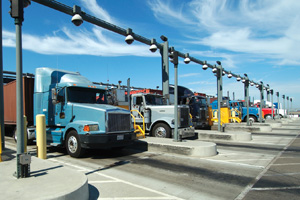L.A. Port to Ask Six Carriers for Refunds on Subsidies Given to Buy Clean Trucks

This story appears in the June 6 print edition of Transport Topics. Click here to subscribe today.
After nine months of wrangling over drayage truck data, Port of Los Angeles officials said they plan to soon ask six carriers who received subsidies for purchasing new cleaner-running trucks to refund a total of more than $1.5 million for trucks that did not make enough trips to the port last year.
Officials said a revised final analysis, released to Transport Topics last week, showed that just under 400 of the more than 2,000 new, cleaner-burning tractors the carriers bought using port funds failed to meet the required 150 container pickup trips for the year ending June 30, 2010.
To help reduce diesel emissions, the port’s clean trucks incentive program in 2009 gave drayage operators up to $20,000 for each new 2007 federal emissions-compliant truck purchased, but also required that carriers make at least 150 trips to the port every year for a period of five years.
For every year that carriers do not meet the annual minimum number of trips, they must reimburse the port up to $4,000 for each truck that fell short of the requirement.
Port officials said all but six of the 60 carriers awarded incentive funding met the minimum for the first year.
Truckload carrier Swift Transportation Co. Inc., Phoenix, owes the port more than $1.4 million for the first year of the five-year contract since most of the 591 trucks it purchased under the program didn’t make frequent visits, according to the port analysis.
By comparison, the other five drayage operators who fell short only owed the port a total of $107,000 for the year, port officials said.
John Holmes, deputy executive director for port operations, said the companies were sent invoices for repayment in August 2010. Since then, the port and drayage companies have been comparing company trips data and port trips data to adjust the final numbers.
“Our data and the data the companies had in some cases were a little bit different,” Holmes told TT. “So we spent a great deal of time trying to make sure that the data was consistent.
“We’re now at a point where we feel comfortable enough with the picture that we’re ready to go to our attorneys and see where they want to go from here.”
Dave Berry, a Swift vice president, declined to comment on the data or amount the company owed to the port.
Kenneth Foos, controller of Meyer Trucking Inc., told TT that his company has been granted a waiver from reimbursing the port the $80,000 it owes. Meyer bought 30 trucks using program funding.
Foos said Meyer is a plaintiff in an unfair business practices lawsuit against a company it was involved with and that it no longer does business in the port
“We’ve moved on to bigger and better things,” Foos said.
However, a port spokesman said different.
“The Port of Los Angeles has not forgiven the debt to any of the companies that owe us money,” said the spokesman, Phillip Sanfield.
Port officials said the other four drayage operators who will be billed for repayment are Central Cal Transportation, $16,000; Knight Transportation, $4,000; LMD Integrated Logistic Services Inc., $3,000; and Pacer Cartage, $4,000.
Holmes said the port continues to monitor the number of trips made by the 60 carriers that were given subsidies. For the first nine months of the second contract year, the trend has remained consistent with the first year, Holmes said.
The second year of the contract ends June 30.
“Frankly, those people that didn’t do well the first year for the most part it looks like they’re not doing as well the second year,” Holmes said.
Last year, one member of the port’s board of directors said that if drayage operators did not make frequent visits to the port, the subsidy was essentially an interest-free loan for new trucks that could be used outside the port.
However, Holmes said he convinced that all the carriers acted in good faith.
“Some people were more speculative than others, but every one was prepared to go heart and soul into the drayage industry,” Holmes said.
“If I had no intention of bringing trucks into the port, I guess it would be an interest-free loan,” Holmes said. “But if I did bring the trucks in and just didn’t have enough work for them, it’s tantamount to a bad business deal that I made.”
Chris Cannon, the port’s director of environmental management, said the program analysis of money owed will now be presented to port attorneys and to the port board of directors for final approval in upcoming weeks.




